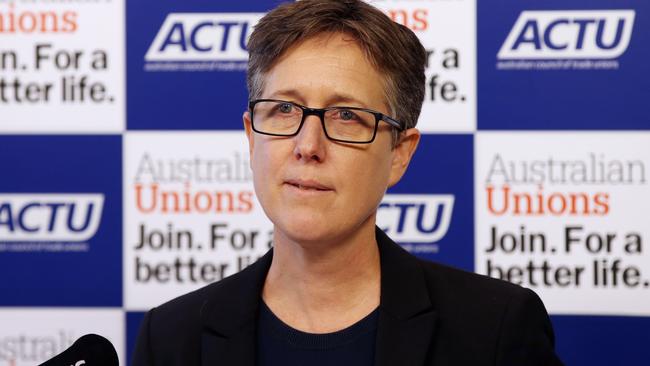Bill Shorten shows unions won’t have it all their own way


To be sure, Labor has backed many policies that unions have been arguing for, such as reinstating penalty rates, cracking down on “dodgy” work visas, increasing penalties for wage theft, improving labour hire arrangements and returning to a limited form of pattern bargaining.
Yet Shorten, in an interview with The Weekend Australianlast week, said he had plenty of pro-business policies such as company tax cuts, accelerated deductions for investment, boosting apprenticeships and funding new transport and road infrastructure, and would not be captive to the unions.
“I’ve never hidden the fact that I’m a member of a trade union,” he said. “But I’ll be very clear because the government loves to muddy this water. To borrow from R.J. Hawke, I will work with all sectors, but I’ll be a handmaiden to none.”
In the past fortnight, Shorten has signalled that Labor does not agree with the ACTU in several notable areas. This has not gone unnoticed in the union movement or in the parliamentary party.
First, he has made it clear he opposes the ACTU’s push for union leaders to use their positions on industry superannuation fund boards to force companies to improve employee wages and conditions. He made it clear that trustees must act in the interests of fund members not union members.
“The superannuation legislation is black and white,” Shorten said. “Trustees have to act in the best interest of their members. They’ve got to hang up the hat of whatever organisation they might work for or sponsor them at the door of the meeting.”
Second, Shorten has outlined how Labor would deliver a new living wage. Given stagnant wage growth and cost of living pressures, this policy will be welcomed by many voters. Although business is opposed to the idea, Labor’s approach is sensible.
Labor will ask the Fair Work Commission to identify the new living wage and then phase it in over time, taking into account the impact on the economy and the capacity of businesses to pay. It will only apply to the 1.2 million workers currently on the minimum wage and not flow through to those on awards.
This is a rebuff to the ACTU who have been pushing for a living wage set at 60 per cent of the median full-time wage, or $852 a week, which represents an 11.5 per cent increase in the minimum wage over two years. They want it implemented now without any regard to the economy, business capacity or productivity.
And third, this week Shorten flatly rejected ACTU secretary Sally McManus’ demand that Labor preference Pauline Hanson’s One Nation party above the Liberal Party. Shorten has taken a principled stand and said One Nation should be preferences last on Labor’s ballot papers, not the Liberal or National parties.
“My clear view — and I’ve stated it to union leaders — is yes, I know that traditionally you say put the LNP last,” he said. “But I think One Nation’s performance in recent times and that of Fraser Anning (mean) I think they have to be put last,” he said. “I would rather see Labor’s preferences go to the LNP first rather than to the One Nation party.”
Make no mistake, a Shorten Labor government will be a union-friendly government. But the unions will not get everything they want. There will be disagreements. Unions will have to make the case for policy change rather than ask for a rubber stamp. They might have to learn to negotiate again.
Over the past year, Shorten has become more self-assured, confident in Labor’s policies and has increased his authority inside the party. He is, on some things at least, shifting towards are more moderate position. It is an encouraging sign.



When Bill Shorten pledged not to be a “handmaiden” for unions and work cooperatively with business it was predictably met with a fair dose of scepticism. But there are signs he is pushing back against the unions on key areas of policy and political strategy.